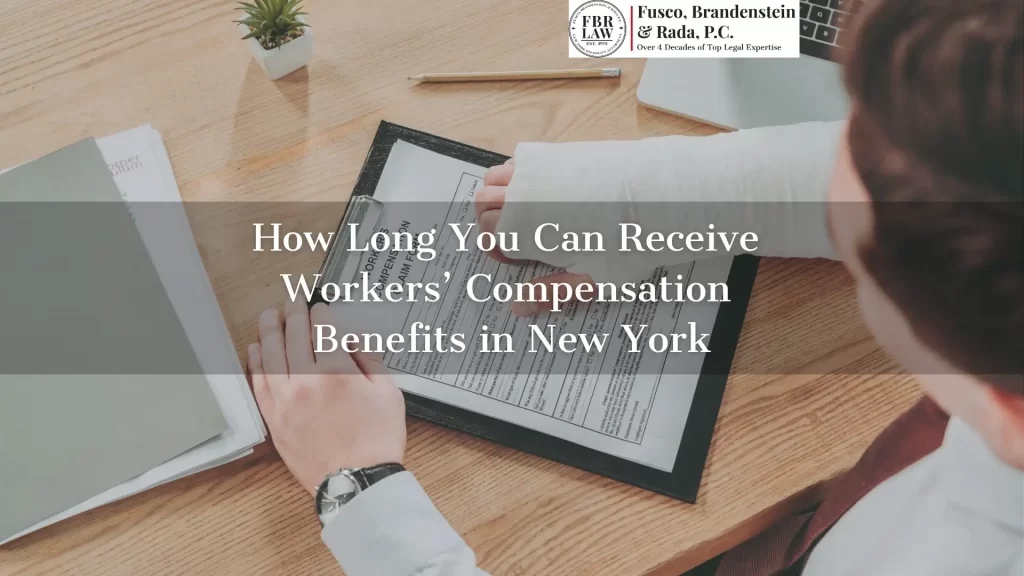
If you were injured in a workplace accident, you might be eligible for workers’ compensation benefits. How long you can receive benefits depends on a variety of factors, but it is possible that you could be eligible for lifetime workers’ comp benefits. Read on to learn more.
An Overview of Workers’ Compensation Benefits
New York employees whose employers carry workers’ compensation insurance are eligible for workers’ compensation benefits if they get hurt or sick on the job. To maintain eligibility for benefits in New York, a worker must report their illness or injury to their employer within thirty days.
Workers’ comp benefits cover all reasonable and necessary medical treatment for work-related injuries or illnesses. This includes the costs of doctor’s visits, surgeries, hospitalizations, physical therapies, prescription medications, and more. Injured workers must see providers authorized by the Workers’ Compensation Board to qualify for medical coverage.
Workers’ compensation can also provide wage replacement benefits for as long as an injury prevents you from working. These benefits only kick in if you’re off work longer than seven days. The amount of your wage replacement benefits will depend on the average weekly wage you earned before the injury.
If you suffer a long-term or permanent disability due to a work injury or illness, you could also collect disability benefits. Available types of disability benefits include:
- Temporary Total Disability (TTD) Benefits: TTD benefits compensate workers who are completely unable to work for a temporary period due to a work-related injury or illness.
- Temporary Partial Disability (TPD) Benefits: TPD benefits come into play when a worker can return to work but can’t earn as much as they used to because of their condition.
- Permanent Partial Disability (PPD) Benefits: PPD benefits are for workers who suffer a permanent impairment due to a work-related injury or illness but can still perform some work.
- Permanent Total Disability (PTD) Benefits: PTD benefits are for workers who are permanently and totally unable to maintain any gainful employment in the future.
How Does Reporting Work?
Under Chapter 67 of New York law, employers must report qualifying employee injuries to their workers’ compensation insurers. Injured employees can request copies of these reports, which employers must provide by law.
Employers who fail to report worker injuries promptly can face misdemeanor charges under Chapter 67. Employees cannot get benefits until their employers file reports and the Workers’ Compensation Board makes a determination.
What’s Maximum Medical Improvement and How Does it Apply?
The length of time you can receive workers’ compensation benefits will depend in part on when you reach maximum medical improvement (MMI).
MMI is the point at which a physician determines no further treatment could improve your condition. After you reach MMI, any temporary partial disability or temporary total disability payments you were receiving could stop. But if your doctor determines you have a permanent disability due to your injury, you could continue receiving benefits.
Differences Between Temporary and Permanent Disability
You receive temporary benefits while you’re off work due to an occupational injury or illness. These benefits are based on your average weekly wage (AWW). If you have a temporary total disability, you can receive up to two-thirds of your AWW in weekly benefit payments. If you have a temporary partial disability, you can receive up to two-thirds of the difference between your pre- and post-injury earnings.
If your doctor determines you have a permanent disability after you reach MMI, you could receive permanent partial disability (PPD) benefits or permanent total disability (PTD) benefits. PPD benefits are based on your AWW and the extent of your disability. They can last up to 525 weeks. In some cases, PTD benefits could last for life if you are totally and permanently unable to work.
How Long Can I Receive Workers’ Compensation Benefits in New York?
 The Workers’ Compensation Board in New York sets a strict schedule for benefit payments. When you are temporarily unable to work at all right after your injury, you will likely be eligible for the full lost wage benefit. If you’re able to return to work that doesn’t pay your usual wages, you’ll be eligible for benefits that pay a percentage of the difference between your original salary and your current wages. If you can never work again, you get the full wage benefit for life. If you develop a disability that affects your earning capacity, you’ll be eligible for lost wage benefits that could last for ten years, depending upon the percentage of your disability-related wage loss. The duration of your benefits will ultimately depend upon the extent of your disability-related wage loss. The schedule is as follows:
The Workers’ Compensation Board in New York sets a strict schedule for benefit payments. When you are temporarily unable to work at all right after your injury, you will likely be eligible for the full lost wage benefit. If you’re able to return to work that doesn’t pay your usual wages, you’ll be eligible for benefits that pay a percentage of the difference between your original salary and your current wages. If you can never work again, you get the full wage benefit for life. If you develop a disability that affects your earning capacity, you’ll be eligible for lost wage benefits that could last for ten years, depending upon the percentage of your disability-related wage loss. The duration of your benefits will ultimately depend upon the extent of your disability-related wage loss. The schedule is as follows:
- Greater than 95% earning capacity loss: 525 weeks
- 90% – 95% earning capacity loss: 500 weeks
- 85% – 90% earning capacity loss: 475 weeks
- 80% – 85% earning capacity loss: 450 weeks
- 75% – 80% earning capacity loss: 425 weeks
- 70% – 75% earning capacity loss: 400 weeks
- 60% – 70% earning capacity loss: 375 weeks
- 50% – 60% earning capacity loss: 350 weeks
- 40% – 50% earning capacity loss: 300 weeks
- 30% – 40% earning capacity loss: 275 weeks
- 15% – 30% earning capacity loss: 250 weeks
- Less than 15% earning capacity loss: 225 weeks
Does COVID-19 Qualify As a Workplace Injury Covered by Workers’ Comp?
It depends. In New York, workers can qualify for workers’ compensation benefits for COVID-19 if their exposure was work-related. Eligible workers can file claims through the New York State Workers’ Compensation Board website.
These claims are more common among workers with high public exposure, like healthcare and food service workers. To prove a COVID-19 claim, you must demonstrate your elevated risk of exposure at work and provide medical evidence linking the illness to your job.
If the Board accepts your COVID-19 claim, you could receive monetary benefits for losses stemming from your illness. Benefits can cover your medical treatment costs and replace a portion of lost wages from missed work days.
What Is the Filing Deadline for Workers’ Compensation in New York?
Initially, you must notify your employer of the injury or illness within 30 days. If you do not receive the benefits you are due, you have two years to file a claim with the New York State Workers’ Compensation Board. This two-year filing window starts on the date when you got hurt or became aware of your qualifying work-related condition. A New York workers’ comp attorney can help you identify important deadlines and avoid losing benefits to preventable filing errors.
Fusco, Brandenstein & Rada, P.C. Is Here to Help
If you get hurt at work, you’ll want to know how much money you are due. Our workers’ comp attorneys in New York can fight relentlessly to get you the benefits you deserve. Call our disability lawyers today at 516-496-0400 or contact us online for your free case evaluation. The legal team at Fusco, Brandenstein & Rada, P.C. has the experience necessary to handle every aspect of your claim.
Related Reading:
